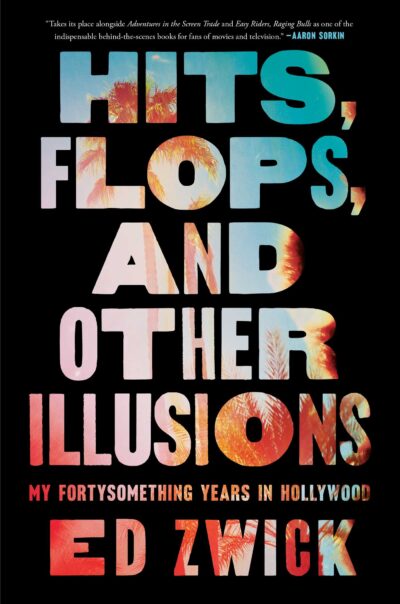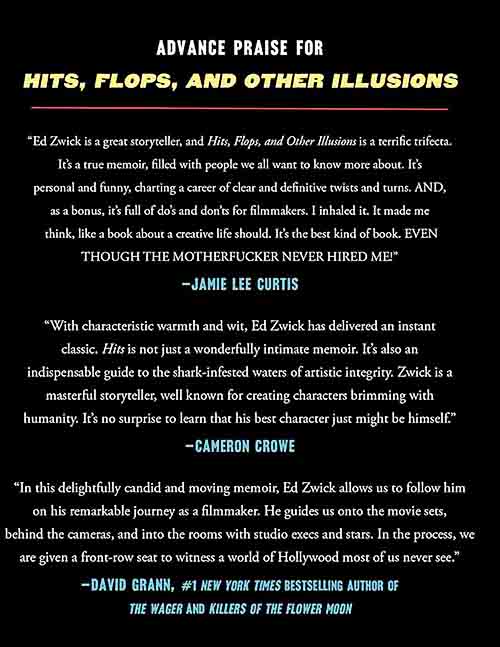 By ED ZWICK (Gallery Books; 2024)
By ED ZWICK (Gallery Books; 2024)
Ed Zwick is a screenwriter, TV impresario and director of high profile films like ABOUT LAST NIGHT, LEGENDS OF THE FALL, THE SIEGE and THE LAST SAMURAI. He’s had some successes in the latter category, and turned out one authentically great movie (1989’s GLORY) but also several misfires (COURAGE UNDER FIRE, DEFIANCE, LOVE AND OTHER DRUGS, JACK REACHER: NEVER GO BACK, etc.), and he never succeeded in attaining household name status among cineastes. Still, the fact that Zwick has managed to maintain his position in Hollywood for “fortysomething” years, and attract a great deal of A-list talent, is an impressive feat.
This 2024 memoir begins with an extremely telling line: “I tell stories for a living.” Storytelling is a category in which HITS, FLOPS AND OTHER ILLUSIONS excels, with Zwick’s screenwriting skill evident in the pacing, structure and overall layout. Each chapter is organized around a theme (aging, on-the-job training, political activism, etc.) that’s dutifully carried through, with a minimum of verbiage expended on childhood memories and family drama (about which all we really learn is that Zwick has a tendency to neglect his loved ones when he’s directing movies).
Curiously, Zwick’s television work is similarly neglected. His labors on the writing staff of FAMILY (“the second best thing that ever happened to me. The best was when it was cancelled”) are dispensed with quickly, while his infamous 1983 TV movie SPECIAL BULLETIN, which served as a late Twentieth Century answer to the WAR OF THE WORLDS panic broadcast, gets barely half a chapters’ worth of coverage. Zwick’s TV series THIRTYSOMETHING (1987-91) and MY SO-CALLED LIFE (1994-95), the first of which was quite a phenomenon in its day and the second a legend on the cult TV circuit, are likewise given shockingly brief coverage, with the book’s major focus being Zwick’s film work.
Zwick’s filmmaking career never quite reached the heights attained by colleagues like David Lynch (with whom Zwick attended the AFI Conservatory in the 1970s), Oliver Stone and Zwick’s mentor Sydney Pollack, and this book shows why. Quite simply, he’s too intellectually oriented and politically motivated to fully thrive in what Werner Herzog dubbed an “art of illiterates.” Just take into account Zwick’s filmic influences, which include Z, IT’S A WONDERFUL LIFE and THE BATTLE OF ALGIERS. Great films to be sure, but I say he’d have done well to immerse himself in the cinema of Roger Corman, or even that of Ed Wood, and developed a “stomach brain,” defined by Zwick as an instinct for “something that either tastes right…or it doesn’t.”
Yet Zwick’s intellectual bent makes for a pleasant book that’s literate, self-deprecating and, of course, dishy. Among the revelations Zwick offers up: that Jim Belushi gave him trouble (but eventually recanted) during the filming of ABOUT LAST NIGHT, that Matthew Broderick was a royal pain in the ass on GLORY, and that Julia Roberts put him through the ringer during pre-production on SHAKESPEARE IN LOVE (and then dropped out of the project), while the executive producer of that opus, Harvey Weinstein, behaved like Harvey Weinstein.
Also on display are an anti-woke screed that belies Zwick’s leftist politics (“To shrink from any subject because it is hurtful or politically sensitive…is to deny one of the most important functions of art, which is to be provocative. So, I’m sorry I offended anyone. But I’m really not”) and bluntly stated instructional portions at the end of each chapter, asserting the harsh lessons Zwick has learned over the years. Aspiring filmmakers could certainly do worse than to peruse this book, which if nothing else offers a highly entertaining read.

